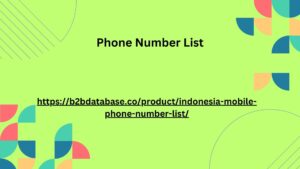How can businesses handle the costs associated with bulk SMS marketing?
Posted: Sun Sep 08, 2024 6:09 am
How businesses can manage the costs associated with bulk SMS marketing
Bulk SMS marketing can be a powerful tool for reaching customers directly and quickly. However, the costs associated with sending a large volume of text messages can add up. Here are some strategies to help businesses manage these costs:
1. Choose a cost-effective SMS provider:
Compare pricing plans: Look for providers that offer competitive pricing, especially for high-volume usage.
Consider bundled services: Some providers Indonesia Mobile Phone Number List may offer discounts for combining SMS marketing with other services such as email marketing or social media management.
Check for hidden charges: Be aware of any additional charges, such as setup fees, maintenance costs, or international message fees.
2. Optimize your messaging:
Be brief: SMS messages have a character limit (usually 160 characters), so make every word count.
Use strong calls to action: Be clear about what you want the recipient to do, whether it's visiting your website, making a purchase, or signing up for a newsletter.
Personalize your messages: Tailor your content to your recipient's interests and preferences to increase engagement.
3. Segment your audience:
Target specific demographics: Send messages only to customers who are likely to be interested in your products or services.
Use customer data: Use information about your customers' purchase history, preferences and behavior to create targeted campaigns.
4. Strategically time your messages:
Send at optimal times: Consider your audience's time zone and daily routines when planning your messages.
Avoid peak hours: Sending messages during peak hours can increase costs due to higher network congestion.

5. Monitor and analyze your campaigns:
Monitor key metrics: Measure the open rate, click-through rate and conversion rate of your SMS campaigns.
Identify what works: Analyze the performance of different messages and adjust your strategy accordingly.
6. Use SMS automation:
Use automated workflows: Set up automated SMS campaigns based on specific triggers, such as abandoned carts or customer birthdays.
Reduce manual effort: Automation can help you save time and money while ensuring consistent messaging.
7. Explore alternative messaging options:
Consider RCS: Rich Communication Services (RCS) offers more features than traditional SMS, such as richer content, group chats, and file sharing. Although RCS may be more expensive, it can provide a more engaging experience for your customers.
Explore WhatsApp Business: If your target audience is primarily on WhatsApp, consider using WhatsApp Business for your communication campaigns.
By following these strategies, businesses can effectively manage the costs associated with bulk SMS marketing while maximizing the return on their investment.
Bulk SMS marketing can be a powerful tool for reaching customers directly and quickly. However, the costs associated with sending a large volume of text messages can add up. Here are some strategies to help businesses manage these costs:
1. Choose a cost-effective SMS provider:
Compare pricing plans: Look for providers that offer competitive pricing, especially for high-volume usage.
Consider bundled services: Some providers Indonesia Mobile Phone Number List may offer discounts for combining SMS marketing with other services such as email marketing or social media management.
Check for hidden charges: Be aware of any additional charges, such as setup fees, maintenance costs, or international message fees.
2. Optimize your messaging:
Be brief: SMS messages have a character limit (usually 160 characters), so make every word count.
Use strong calls to action: Be clear about what you want the recipient to do, whether it's visiting your website, making a purchase, or signing up for a newsletter.
Personalize your messages: Tailor your content to your recipient's interests and preferences to increase engagement.
3. Segment your audience:
Target specific demographics: Send messages only to customers who are likely to be interested in your products or services.
Use customer data: Use information about your customers' purchase history, preferences and behavior to create targeted campaigns.
4. Strategically time your messages:
Send at optimal times: Consider your audience's time zone and daily routines when planning your messages.
Avoid peak hours: Sending messages during peak hours can increase costs due to higher network congestion.

5. Monitor and analyze your campaigns:
Monitor key metrics: Measure the open rate, click-through rate and conversion rate of your SMS campaigns.
Identify what works: Analyze the performance of different messages and adjust your strategy accordingly.
6. Use SMS automation:
Use automated workflows: Set up automated SMS campaigns based on specific triggers, such as abandoned carts or customer birthdays.
Reduce manual effort: Automation can help you save time and money while ensuring consistent messaging.
7. Explore alternative messaging options:
Consider RCS: Rich Communication Services (RCS) offers more features than traditional SMS, such as richer content, group chats, and file sharing. Although RCS may be more expensive, it can provide a more engaging experience for your customers.
Explore WhatsApp Business: If your target audience is primarily on WhatsApp, consider using WhatsApp Business for your communication campaigns.
By following these strategies, businesses can effectively manage the costs associated with bulk SMS marketing while maximizing the return on their investment.